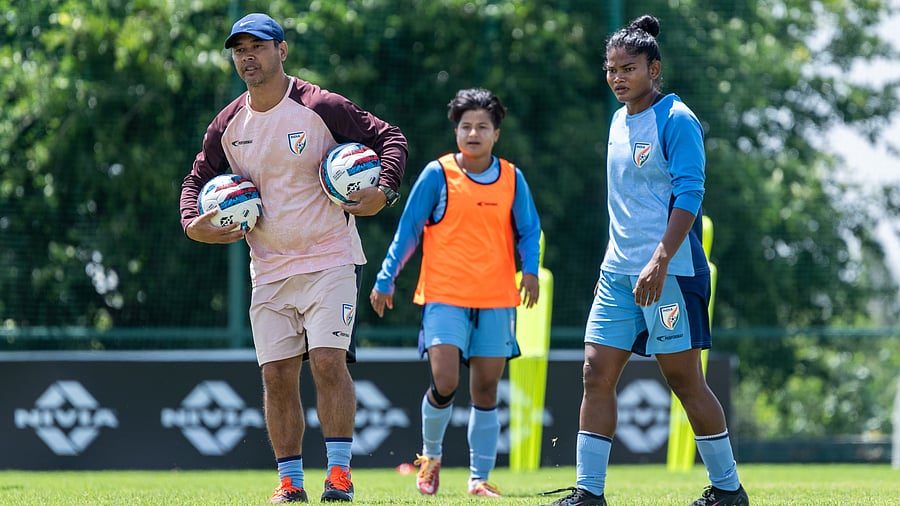
Crispin Chetrri (left), coach of the Indian women's football team, during a training session at the Padukone-Dravid Centre for Sports Excellence (PDCSE) in Bengaluru.
Credit: AIFF MEDIA
Bengaluru: World No. 69 is the current FIFA ranking of the Indian women’s football team. This is the worst ranking the national team has plummeted to since July 2003, when an official women’s ranking system began, with India at 56 before reaching their best at 49 in December 2013.
The numbers suggest that it is a team in desperate need of a rejig. At the helm of it is Crispin Chetrri, the head coach of the Indian women’s football squad appointed in February this year, who accepts that the team is ‘down’ but refuses to believe that they are ‘out’.
The 50-year-old claims he has a vision to re-build and revive Indian women’s football. And the former footballer is adamant to implement his cause without fearing implications.
“I’m not scared of losing. Not even my job,” Chetrri, who is from Darjeeling, declares. “That’s the first step, to overcome the fear of losing on the pitch. That’s what I’m trying to get rid of from the players’ minds.”
Since taking over as coach, the team has lost to Korea (0-3) and Russia (0-2) and scored a win against Jordan (2-0) in the league phase of the Pink Ladies Cup in Dubai in February. His biggest test will be the AFC Women’s Asia Cup qualifiers from June 23 in Chiang Mai, Thailand where India are placed in Group B along with hosts, Mongolia, Iraq and Timor Leste.
In his attempt to go beyond what is the obvious task ahead of a big assignment, Chetrri and his group of support staff have been busy preparing a 34-member Indian probable squad at the Padukone-Dravid Centre for Sports Excellence (PDCSE) in Bengaluru for over a month now. From overturning the mindset to team building, from focussing on strength and conditioning to improving set pieces, Chetrri & Co are focussed on changing the narrative.
“I’ll give you an example. Some of the juniors in the team come from tribal pockets of Odisha, Jharkhand and Chhattisgarh where generations of women have been dominated over. When I give strict instructions during training sessions, instead of opening up and facing it boldly, they hide away.
“That’s why I make such juniors captains in friendlies. So that they learn to take responsibility of leading a group, learn decision-making and have the guts to speak out. Performing at the international stage is a culmination of all these factors,” Chetrri tells DH.
Without mincing words, the coach addresses the lack of a strong domestic culture and structure in the country that is hindering the progress of women’s football.
“India has a vision of playing in the 2047 World Cup. For that to happen, we have to figure out specific zones across India and create a centre of excellence like this (PDCSE) in each one of them in the next two years.
“Then we have to focus on creating a pool of coaches. By 2030 start a proper sub-junior baby league for the age group of 8-12 year old girls. Then we send scouts to identify young talent and send them to sports schools because education is also important.”
A finite talent pool is limiting the number of girls being picked for the national set-up and that’s another cause of concern, rues Chetrri.
“The IWL (Indian Women’s League) has eight teams with eight Indians and three foreigners in them. Now, we have only 64 girls who are visible to choose from apart from a few picks from the nationals. Increasing the IWL teams to 12, sending scouts to Khelo India, University Games, police meets is the way forward.”
“Out of the lot (probables) 15-20 players are seniors, who are really good no doubt, but they don’t fit into the long term goals simply because they are aging. If I have a plan for 2031 how can we have the seniors in mind? I know I’m a very bad coach for some of the senior players because of this perspective of mine. But I’m looking to develop women’s football in the long run.”
In preparation for the AFC qualifiers, India played two friendlies against the 50th-ranked Uzbekistan here at the academy, going down 0-1 in both matches last Friday and on last evening.
For Chetrri, who believes the team is a work in progress, the positive from the two games has been the increased number of scoring chances India managed to create. Will the conversion of goals on the field and in his blueprint to uplift women's game become fruition? Time will tell.